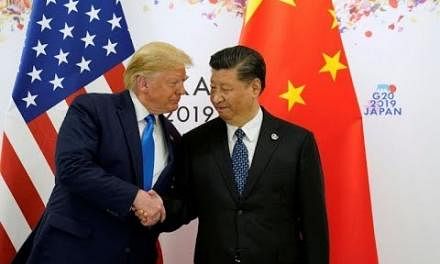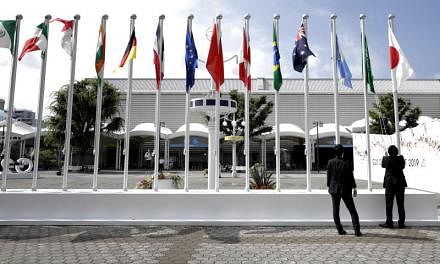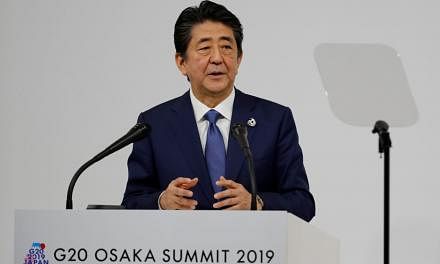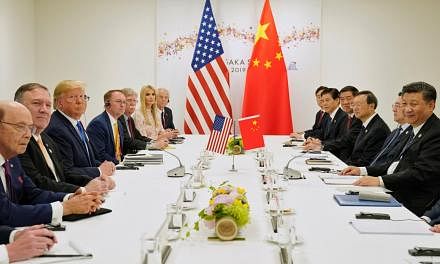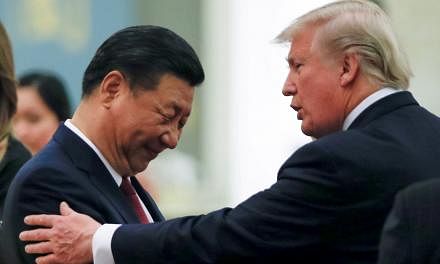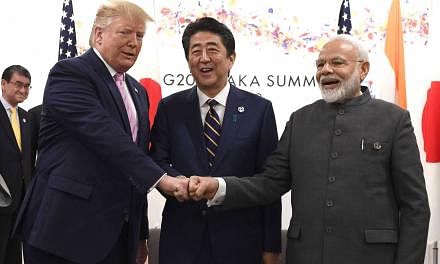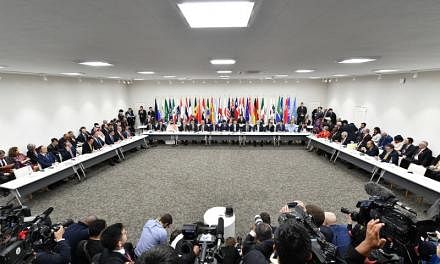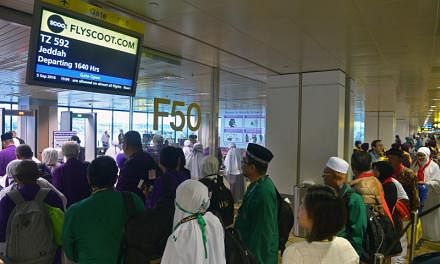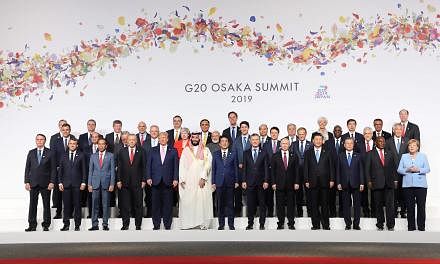OSAKA -As the Group of 20 (G-20) leaders' summit opened on Friday (June 28), it fast became fertile ground for a clash in values, from trade to climate change and politics, despite Japanese Prime Minister Shinzo Abe's best attempts as host to find common ground.
In his remarks at the opening of the meeting, which Mr Abe said he hoped would be one where "differences are not highlighted but common ground is found", he called on leaders to take steps to mitigate the economic risks in the world that have arisen because of trade frictions.
In doing so, it will be crucial for leaders to "communicate a strong message to maintain and strengthen the free, fair and non-discriminatory trading system"," he told leaders of the world's 20 most eminent economies.
Singapore is one of eight non-G-20 countries invited to attend the meeting.
"A free and open economy is the foundation of global peace and prosperity," Mr Abe said. "While anxiety and discontent with abrupt changes due to globalisation can at times generate the temptations for protectionism, bringing about sharp confrontation between states, tit-for-tat trade restrictive measures are to the benefit of no one."
He stressed that Japan, as a flag-bearer for the multilateral trading system, welcomes agreements that create mega-economic zones.
Mr Abe spearheaded a revised Trans-Pacific Partnership (TPP) deal after United States President Donald Trump jettisoned the deal, while the economic partnership agreement (EPA) between Japan and the European Union is the largest trade pact in the world.
Japan is also party to the 16-nation Regional Comprehensive Economic Partnership that includes Asean, China, South Korea, India, Australia and New Zealand, and is separately in talks with China and South Korea for a trilateral trade deal.
"Japan as a flag-bearer of free trade will continue to promote forcefully the improvement of the multilateral trading system, as well as negotiation of EPAs," he said.
His comments came even as Washington has upped the stakes on bilateral trade, with Mr Trump seeking to redress the US' respective trade deficits with China, Japan, India and the European Union.
While the G-20 bloc is likely to agree on a generic phrase, "the promotion of free trade", in the final leaders' document to be issued on Saturday - doing away with any strong commitment against protectionism - the leaders are still poles apart on how to get there.
US President Donald Trump on Friday made clear in separate summit meetings with Mr Abe and Indian Prime Minister Narendra Modi, ahead of much-anticipated talks with Chinese President Xi Jinping on Saturday, that his priority was to conclude trade deals that would benefit the US economy.
On the flipside, Mr Xi was among the world leaders who rallied against protectionism and its threat to the global economy.
"All this is destroying the global trade order," he said at a meeting with leaders of the Brics (Brazil, Russia, India, China and South Africa) group of emerging economies. "This not only impacts the common interests of our countries but also overshadows global peace and stability."
Meanwhile, it has also emerged that Washington is pressuring its allies in the G-20 to water down the language on climate change.
French President Emmanuel Macron has threatened not to endorse the communique if a reference to the Paris Accord was removed, which he described as a "red line".
"The Americans are trying to weaken the message and to rally to their position a number of states," the Agence France-Presse cited a French presidential source as saying.
Meanwhile, Russian President Vladimir Putin's suggestion in an interview with the Financial Times that liberalism was "obsolete" also provoked ire, with European Council Donald Tusk saying that Europe will "firmly and unequivocally defend and promote liberal democracy".
In a thinly-veiled message, he added to reporters: "What I find really obsolete are: authoritarianism, personality cults, the rule of oligarchs. Even if sometimes they may seem effective."
Separately, world leaders on Friday launched the so-called Osaka Track on digital governance rules to promote the concept of Data Free Flow with Trust.
The declaration was adopted after brief remarks by leaders including Mr Xi, who stressed the need for a set of rules to herald a digital age where data is the equivalent of what oil is to the industrial economy.
He said, vowing to keep the Chinese market open: "We need to leverage the role of the digital economy as a catalyst to drive the integration of the Internet of Things and artificial intelligence with the real economy, so as to cultivate new drivers of growth."
Mr Trump agreed that digital rules were important in an era of digital trade, but stressed the need to "ensure the resilience and security of our 5G networks, which is essential to our shared safety and prosperity".
But the Osaka Track was itself contentious as India did not participate in the event while Egypt, Indonesia and South Africa did not sign on to the final declaration, in which countries pledged among other things their commitment for international rule-making on trade-related aspects of e-commerce.
Japanese Foreign Press Secretary Takeshi Osuga, asked about their abstention, told reporters at a press briefing: "There are different positions and views with regard to rule-making on the digital economy, but the first step to take is to promote negotiations at the World Trade Organisation (WTO) on e-commerce."


